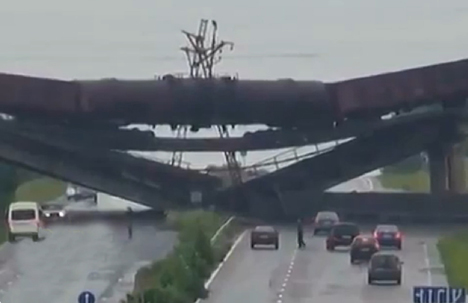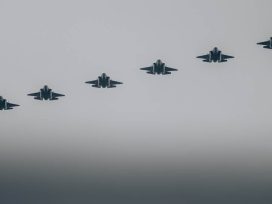Can the West come up with an effective response to Putin’s policies in Ukraine? So far, it clearly has not. Part of the difficulty in responding, though, derives from uncertainty over what Putin’s ultimate aims there may be.
I will discuss here the different possibilities as to what Putin’s goals both toward Ukraine and Europe more broadly might be, the underlying policy logic that appears to inform Putin’s policies, the advantages as well as disadvantages Putin’s policies are encountering at present and going forward, the broader international context in which the Ukraine crisis is occurring, and some policy options that the West might consider.
Putin’s goals unclear
Putin’s minimum goal appears to be to prevent Ukraine from joining NATO or increasing cooperation with the EU by creating a frozen conflict in Donbas while still recognizing it as formally part of Ukraine. His preferred “solution” for the conflict might be to allow for an actual cease-fire to take place in exchange for the federalization of Ukraine which would permit the Donbas region to veto Ukraine’s adhesion to NATO and the EU – similar to the role played by the Srbska Respublika in Bosnia-Herzegovina.

The destruction of a railway bridge in Donbass, 25 July 2014. Source:Wikipedia
Or more ambitiously, Putin may still hope to expand Russian control over “Novorossiya” – the Donbas plus the southern region of Ukraine along the Black Sea all the way to (and including) Transnistria. This region could be annexed by Russia, but it might serve Putin’s plans to allow it to remain formally part of Ukraine as a federal region that could also veto the rest of Ukraine’s adhesion to NATO and the EU.
Or perhaps Putin intends to extend Moscow’s “protection” to Russian populations living elsewhere, including northern Kazakhstan, Belarus, and most ominously, the Baltic states that have joined NATO.
The maximum goal he might have, which some in the West fear, is that Putin seeks to render NATO and even the EU ineffective through allying with disgruntled leaders of member states such as Hungary and Greece and/or threatening a region-wide war in order to prevent these organizations from responding effectively to Russian aggression. Indeed, in this scenario, the acquisition of territory for Russia in Ukraine and elsewhere may be less a final goal for Putin than a means to undermine or even destroy NATO and the EU, and restore Russia’s “proper place” in the European order.
It is also possible that Putin wants to convince the West that he is pursuing more aggressive goals in order to induce them to implore Moscow to accept the achievement of more minimal ones (Russian annexation of Crimea, prevention of Ukraine from joining NATO and the EU) in exchange for ending sanctions against Russia and resuming business as usual with it.
There may be other possibilities still, but perhaps we have explored enough. Suffice it to say that Putin has not clearly specified what his ultimate goals are – perhaps because these are subject to change depending on what he thinks he can or cannot achieve.
Putin’s underlying logic
Whatever his actual foreign policy goals may be, two seemingly contradictory propositions appear to underpin Putin’s policies toward Ukraine and toward the West as a whole.
The first is that America and at least some European governments are determined not just to weaken Russia through the expansion of NATO and the EU and the promotion of “color revolutions” in former Soviet republics such as Ukraine, but also to impose crippling sanctions on and even promote a “colour revolution” inside Russia itself in order to topple the Putin regime and install a “democratic” government subservient to the West.
The second is that NATO and the EU are both weak and divided. Not only are many western countries dependent on Russia for petroleum supplies, but conditions in many (if not all) western states exist which Moscow can exploit in order to strengthen Russia vis-à-vis the West.
Logically, of course, both of these propositions cannot be true simultaneously. If the West really is in a position to weaken Russia or topple the Putin regime, then it must not be weak. And if the West is weak, then it cannot be in a position to weaken Russia, much less topple Putin. It does not appear, however, that Putin sees the contradiction in these two propositions. Further, the logical consequence of holding them both appears to be: to prevent the West from acting on its purported goals of weakening Russia and overthrowing Putin, Moscow can and must act to forestall the West now that it is weak.
Some might ask how Putin can possibly think that the West seeks to weaken Russia, much less overthrow him. The Obama Administration, after all, tried soon after coming into office to “reset” US relations with Russia. And many EU governments have welcomed cooperation with Russia over natural gas in particular. Putin, though, has on numerous occasions described America in particular as the author of the “colour revolutions” in Georgia (2003) and Ukraine (2004), as well as the popular demonstrations against Putin inside Russia (2011-12), and the Maidan Square demonstrations and downfall of Moscow’s ally, Yanukovych, in Ukraine (2014). Putin apparently does not even acknowledge the possibility that these popular uprisings may actually have been popular; his statements indicate utter certainty that they were orchestrated by the West.
Further, while many Europeans might see the expansion of the EU as surely less threatening to Russia than the expansion of NATO, Putin may not agree. Accession to the EU, after all, requires the adoption of EU standards regarding democracy, rule of law, respect for human rights, and both economic competition and transparency – everything, in short, that the Putin regime does not want to see in Russia or former Soviet states it regards as belonging to the Russian sphere of influence. For the EU to have negotiated even an association agreement with Yanukovych, then, was seen by Moscow as threatening to inexorably draw Ukraine out of the Russian orbit and into the western one. Putin lobbied hard to persuade Yanukovych not to sign it in 2013, and to join Putin’s Eurasian Union scheme instead. When Yanukovych complied, Putin may have believed that he had won the contest for influence in Ukraine. But when pro-EU demonstrations arose in Ukraine, Yanukovych subsequently fled from Kiev in early 2014, and pro-western forces came to power there. Putin saw all this as the result of a western-backed plot. Similarly, Obama’s attempt to improve US-Russian relations was seen by Moscow as a ploy to better position Washington to back Putin’s internal opponents. Given these views, it is understandable why Putin may prefer to have openly confrontational relations with the West in order to whip up Russian nationalist support for him and to discredit anyone in Russia calling for improved ties to the West as serving western interests. Russia allowing relations with the West to improve, by contrast, could serve to support democratic forces in Russia.
It may be, then, that Putin does not want to resolve this crisis over Ukraine with the West, but to keep it boiling (if not boiling over). And so we are now in the position that we are in with the West attempting to forestall further Russian advances in Ukraine and elsewhere mainly through imposing economic sanctions while negotiating ceasefires, and with Putin branding his internal opponents as western agents, continuing to push forward in Ukraine, exploiting differences within the West, and threatening worse to come if the West does not stop opposing Moscow.
At this point, it is not at all clear how this crisis between the West and Russia over Ukraine and beyond will end. Something can be said, though, about the advantages and disadvantages Russia has with regard to this conflict which may inform its long-term outcome.
Russian advantages
Russia has demonstrated that it is willing to incur significant costs in order to get its way in Ukraine. The West, by contrast, has shown that it is really not willing to do so. The West is certainly not willing to intervene militarily on behalf of Ukraine. And, as has recently been seen, there is widespread opposition about calls for even shipping western arms to Ukraine. While western governments have shown a remarkable degree of unity in imposing economic sanctions on Russia, it is doubtful whether they can agree on further sanctions due to the unwillingness of some to risk losing their Russian gas or suffer damage to their own economies which this could entail. Although Moscow fears that Ukraine will join NATO or the EU, it is clear that there is insufficient support among the members of both organizations for admitting Ukraine to either. This is not only because this would antagonize Russia but also because of an unwillingness to make the commitments to Ukraine that admitting it to NATO and the EU would entail. Further, the distressing growth in popularity of far right and far left European political parties that espouse an anti-EU, anti-American, anti-austerity, anti-immigrant, and pro-Putin platform limits the willingness of centrist parties to do too much to support Ukraine for fear of an electoral backlash if doing so proves unpopular. By contrast, Russian public opinion appears to remain strongly supportive of Putin and his policies toward Ukraine.
Added to this are the weaknesses of Ukraine itself, which include continued corruption, military incapacity, and sympathy for Russia within the Ukrainian military and other key institutions – all of which result in western governments worrying that any increased assistance to Ukraine could not be used effectively by it.
Russian disadvantages
While Putin may be willing to incur costs in Ukraine, he has been unable to avoid them. And they are mounting. While Russian military actions against Georgia in 2008 and Crimea in 2014 were quickly concluded with the successful achievement of Moscow’s aims, this has not happened in eastern Ukraine. Russian forces and their separatist allies are clearly more powerful than Ukrainian government forces, but they have not succeeded in ending Ukrainian resistance. Casualties on both sides have mounted. Mounting casualties on the Ukrainian side have been widely publicized and have served to strengthen the Ukrainian public’s opposition to Russia (if not support for the Ukrainian government). Moscow, by contrast, has been extremely reluctant to acknowledge that there have been any Russian casualties among the “volunteers” fighting with the separatists. Indeed, Moscow has reportedly cracked down on public discussion of this subject. This suggests that Putin himself recognizes that significant Russian casualties, especially if they continue on and on, could undermine Russian public support for his policy toward Ukraine – and perhaps even for him.
This leaves Putin with a very serious dilemma. The present level of Russian involvement in Ukraine may not be sufficient to end Ukrainian resistance or prevent further Russian casualties. Escalating the conflict in Ukraine, though, may not result in Russia being able to end Ukrainian resistance either, but could well result in greater Russian casualties in a war that could become a quagmire. If halting Russian casualties were his main concern, of course, Putin could simply withdraw Russian forces from eastern Ukraine. But this would not be popular with the Russian nationalists who are now one of his main sources of internal support.
Measures Putin has adopted to limit Russian casualties include the recruitment of Kadyrov loyalists from Chechnya, and plans to bring Tajik troops to Ukraine. However, the willingness of these groups to fight and die for the Russian separatist cause in eastern Ukraine – especially over a prolonged period of time – is highly doubtful. And while the Russian public may be quite tolerant of casualties among non-Russian soldiers, the Chechen and Tajik publics are likely to prove less so.
This points to another problem: the longer the conflict in Ukraine goes on and the perception of Russian forces being bogged down in it emerges, the more likely that dissatisfied groups inside Russia – particularly the North Caucasus – are to see this as a favourable opportunity for them to revolt. And if Moscow has difficulty dealing with just the conflict in Ukraine, it would have more difficulty in dealing not just with the one there, and but also one or more in the North Caucasus and perhaps elsewhere. And although the US and its western allies are not doing this deliberately, their withdrawal from Afghanistan could lead not just to greater Taliban influence in that country, but also to its ability to support Central Asian jihadists that threaten governments backed by Moscow in the region. In short, there is the possibility that Russia getting bogged down in Ukraine could lead to its becoming bogged in other conflicts too.
Even if this does not occur, of course, there is the problem of the negative impact on Russia of continued western economic sanctions as well as low oil prices (which have resulted from different factors not related to Russia), especially if these are prolonged. Russian Deputy Prime Minister Igor Shuvalov claimed that the Russian people will “suffer any privations” in defence of Putin against the West. It remains to be seen, however, whether his confidence will be justified if the economic hardships faced by the Russian public are prolonged.
Further, even without the Ukrainian crisis, Russia continues to be hobbled both by its inability to develop its economy outside of the natural resource sector and by the large-scale siphoning off of Russia’s wealth by Putin and his closest supporters (as described by Karen Dawisha in her recent book, Putin’s Kleptocracy). These trends are weakening Russia in the long run, but Putin has proven unable to rectify the former problem and unwilling to rectify the latter one. Russia’s demographic decline, poor state of health, intolerance toward non-Russian workers despite Russian dependence on them, and emigration of young, educated Russians seeking better opportunities abroad hardly serve to strengthen Moscow vis-à-vis the West either.
Broader dimensions
The Ukraine crisis, as well as the broader deterioration in relations between Russia on the one hand and America and Europe on the other, is not taking place in a void, but in the midst of other momentous events, including growing conflict in the Middle East and elsewhere in the Muslim World, increased tension between China and several of its neighbours, and the rise of India and certain other non-western nations, among others.
What is especially remarkable about the reaction of the world outside the West and the former Soviet Union to the crisis in Ukraine is that it has been remarkably evasive. While Syria and Venezuela have expressed their support for Russia, many other non-western states have adopted a more neutral stance. Several Middle Eastern governments actually seem impatient with the Ukrainian crisis for diverting western attention from the severe crises of their region. The truth of the matter is that this issue just is not as significant for them as it is for countries closer to the conflict zone. Nor do they have any desire to get dragged into it.
Nevertheless, the Ukraine crisis may have broader ramifications. As was seen in mid-2014, Russia reacted to European moves to reduce petroleum imports from Russia by signing a deal to redirect petroleum exports to China – reportedly at a very low price. The longer the crisis between Russia and the West continues, the more likely it is that European-Russian economic ties are likely to fray, and that Russia will become increasingly dependent economically – and perhaps politically – on China.
If this occurs, and if (in the highly likely event) tension between China and India continues, then India is likely to see increasing Russian dependence on China as rendering Moscow unable to serve as a mediator between New Delhi and Beijing, much less restrain China vis-à-vis India. As much, then, as India may want to resume the glory days of Russian-Indian cooperation that characterized the Sino-Soviet rift period in the Cold War, India may find that it is only the West that might be able to help it vis-à-vis China. It is not clear, though, how much the West will be willing or able to do this. Indeed, the lesson that China might learn from the West’s weak reaction to Russian intervention in Ukraine is that the West is unlikely to react strongly to assertive Chinese policy toward its Asian neighbours either.
Another possible ramification is that the western desire to reduce dependence on Russian petroleum might serve as an important inducement for Washington in particular to improve relations with Iran. Europe, after all, cannot simply forego importing gas just because it does not approve of Russian policy toward Ukraine. Iran, though, has huge reserves of natural gas that have not been developed due to American sanctions policy against that country. If Iranian-American relations finally do normalize, then the increased availability of Iranian gas would, in time, allow most European states an alternative to Russian gas. And given both its own economic needs and its own contentious relationship with Russia going back over two centuries now, Iran is not likely to forego the opportunity to profit at Russia’s expense. Israel and the Gulf Arab states, of course, would try to prevent this, but the more tense Russian-western relations become, the more compelling the desirability of a western rapprochement with Iran will become.
Net assessment
It is possible, of course, that the Ukrainian crisis will end soon. The most recent Ukrainian ceasefire may actually take hold. If not, perhaps either the next one or the one after that will. But with Russia having dashed expectations about its willingness to honour ceasefire agreements already, expectations are low that Russia and its allies will behave differently in the future. Besides, both Ukrainian and Russian nationalism have now been thoroughly aroused, and both sides simply do not trust each other. If so, then fighting will continue – in which case it is difficult to avoid the conclusion that in the short run, Putin is in a stronger position than either the West or Kiev. His determination to weaken Ukraine and thwart the West appears very strong, as does his willingness to expend Russia’s human and material resources in order to do so. By contrast, while most (if not all) western governments are deeply disturbed by what Putin has done in Ukraine, they are not willing to risk conflict with Russia over it, or to provide much support to the government in Kiev which appears to have limited state capacity to use such support anyway.
That said, while Putin may succeed in taking away more and more territory from Ukraine, he is not likely to persuade the West to quietly accept this and return to doing business as usual as it essentially did after the war with Georgia in 2008. The more of Ukraine that Moscow takes, the more that western governments are likely to see Putin as someone who cannot be negotiated with (much less socialized into following European norms). While western governments will not want to confront Russia directly, they may become more willing to isolate Putin as well as to immunize Europe from Russian influence through reducing European dependence on Russian petroleum through obtaining these resources elsewhere – even though it will take some time to do this.
Further, a Russian victory in Ukraine, or even beyond, will be unable to halt all the other internal forces (economic, demographic, and political) that are at work weakening Russia. Indeed, continued or expanded Russian intervention will only serve to strengthen them.
Of course, Russia’s self-destructive behaviour may not run its course soon enough to halt Russian expansion into Ukraine or prevent all the suffering that this will entail. Indeed, Putin’s aggressiveness is encouraged by the knowledge that the West is having difficulty coming up with an effective response to him because 1) many European countries (as has been said) do not wish to jeopardize their economic relations with Russia, 2) there is little inclination in Europe or America to react too strongly since public support for confronting Russia more vigorously is weak, and 3) the West (as Putin knows) is divided about how to respond.
So what can be done? My own suggestions are the following:
1) Just like the West did with Georgia after the 2008 Russian-Georgian war, the West should now encourage Ukraine to focus on internal political and economic reform rather than attempting to regain lost territory;
2) Expand the western economic sanctions enacted against Putin’s closest associates to Putin himself;
3) Begin to seize (not just freeze) the assets of Putin and his cronies in the West and use them to set up a fund to compensate the victims of Putin’s policies in Ukraine, Georgia, and Russia itself;
4) Impose travel bans on Putin and his close associates, as has been done vis-à-vis other dictators and their henchmen;
5) Begin to talk about how since the UN Security Council is unable to respond effectively to aggressive policies on the part of Russia because it is a permanent member with veto power, other arrangements to deal with this Moscow will have to be made which Russia is excluded from. One such arrangement might be an informal conclave consisting of all other existing permanent members of the Security Council plus those who have a strong claim to permanent membership as a result of their growing economic and political strength (especially Germany, Japan, India, and Brazil). Indeed, inviting this latter group to participate in it might help them overcome any qualms about the irregularity of the arrangement. At the same time, it should be made clear that Russia would be welcome back into the fold once it ceases to behave so threateningly;
6) Or, in case there are some governments which prefer not to discuss how to reorganize the UN Security Council at this time, begin to discuss how the illegitimate behaviour of the Putin regime makes it unfit to hold Russia’s seat on this body, and so Russia’s vote should instead be trusted to a committee of responsible Russians – perhaps even a government-in-exile – consisting of Russian democracy and human rights activists. This group would be especially useful in distinguishing between what is truly in the Russian national interest and what is only in the interest of its current ruling kleptocracy. This group could also serve as the basis for the emergence of a democratic post-Putin leadership – something that was lacking after the collapse of Gorbachev’s rule when the group that was able to take power were Yeltsin and other elements from the old regime instead of true democrats.
In short, the West should make it clear to Putin and (perhaps more importantly) his associates that they can either continue to enjoy the wealth they have acquired or they can continue trying to expand Russian influence forcefully, but not both.
Now truth be told: I do not expect any of these policy suggestions to be adopted except possibly the first one about urging Ukraine to reform, and even then I doubt Kiev could accomplish much reform in the face of continued Russian aggression. Perhaps, as during the Cold War, the only real option we have is trying to contain the actions of Russia’s authoritarian rulers while at the same time trying to engage the Russian public through helping articulate an alternative vision of a democratic Russia which others would respect and want to cooperate with. But even doing this is something the West can only hope to undertake effectively if western governments – the leading ones anyway – are united in pursuing.







